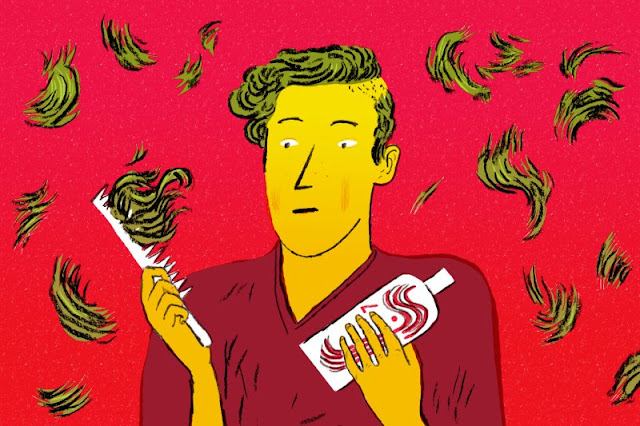 |
| Why Is My Hair Falling Out? |
First, let’s debunk a few myths: Shampooing, brushing and towel drying your hair aren’t making it fall out. “People associate these things with hair loss because they see the hair come away. But these aren’t the cause,” says Dr. Melissa Piliang, a dermatologist with the Cleveland Clinic. In fact, Piliang says shampooing less frequently may make things worse. “It can lead to dandruff and scalp inflammation, which can exacerbate hair loss,” she says.
Hats and ponytails also get a bum rap. “If a ponytail is worn so tightly it pulls on your eyes, that could damage your hair and lead to breakage,” Piliang acknowledges, adding that tight braiding, extensions and weaves—which yank on small groups of hair follicles—can also cause problems. “But generally wearing a ponytail or a hat won’t cause hair loss,” she says.
Men and women lose their hair for different and interrelated reasons, ranging from genetic factors to a poor diet, says Dr. Adam Friedman, director of dermatologic research at the Montefiore-Albert Einstein College of Medicine in New York. “It’s rare for hair loss to be caused by just one thing,” he says.
To understand these causes, it’s helpful to know how your hair works. Similar to the way your skin’s cells turn over, your hair is constantly sprouting, growing and falling out. Guys with healthy hair shed between 60 to 80 follicles a day, while women lose roughly 100, Friedman says.
When it comes to male- and female-pattern baldness—the most common types of hair loss—certain hairs grow in shorter and shorter over time, and eventually stop growing back at all. This is usually the result of a genetic sensitivity to hormones in the skin, Friedman says. “In men, you see this most in the front and sides of the scalp,” he explains. “In women, it’s more centrally located and diffuse.” Friedman says this is a slow process, one that can take years to become apparent.
For these people, drugs that block the production of skin hormones or keep hairs from falling out—such as minoxidil and finasteride—tend to work well, Friedman says. But both are better at stopping hair loss than they are at regrowing hair. “If you’re bald and want treatment, there’s often not much you can do,” he says. For this reason, it’s imperative that you see a doctor as soon as you notice a problem.
Poor nutrition is another potential contributing factor. Friedman says low levels of iron, vitamin D, some B vitamins and zinc have all been linked to hair loss. While typically not the main cause of your thinning mane, nutrient or vitamin deficiencies can make the problem worse, he says. Fixing your diet or taking supplements can help, but it’s often just one part of a multifaceted solution.
If clumps come out when you shower or you notice thinning in just a few weeks or months, you’re more likely dealing with another common condition called acute telogen effluvium, Piliang says. This rapid hair loss is basically a short-term ramping up of your hair’s normal shedding process.
Any event that puts a lot of stress on your body—like childbirth, surgery or rapid weight loss—can result in this alarming, clumpy hair loss, which tends to start a couple months after the event, Piliang says. The shedding can last for six months and may result in your losing up to 70% of your hair. But typically the hair grows back, she explains.
You Asked: Your Top 10 Health Questions Answered
 | |
| You Asked: Your Top 10 Health Questions Answered |
There are many more explanations for hair loss, including scalp infections, inflammatory diseases like alopecia areata, or systemic diseases like lupus. Treatments vary widely and may include a combination of oral or topical drugs, light therapy, dietary changes, and stress-reducing interventions. You really need an expert’s help to assemble all the puzzle pieces, says Dr. Laurel Schwartz, a dermatologist in private practice at the Philadelphia Institute of Dermatology.
If you’re experiencing skin irritation, redness, scaling or pain, Schwartz recommends seeing someone ASAP to head off risks like permanent hair loss and scarring.
More good advice: Stay away from “miracle” cures marketed online or in late-night TV infomercials. They’re not the answer. “Hair loss is such an emotionally charged experience,” Schwartz says. “And when you’re really upset, you’re willing to try anything.” Time spent experimenting with different over-the-counter or infomercial products is often time (and money) wasted.
Your hair can offer a glimpse of what’s going on in the rest of the body, Schwartz says. “If you notice a problem, discuss it with a doctor to determine the ultimate cause.”
Comments: 0